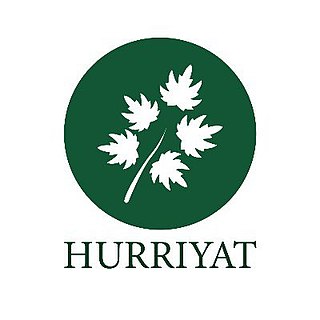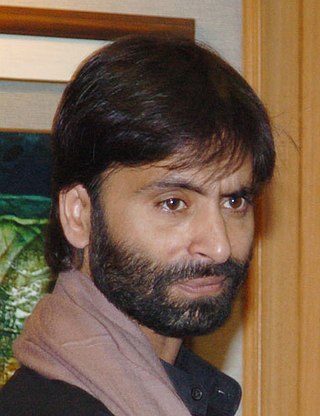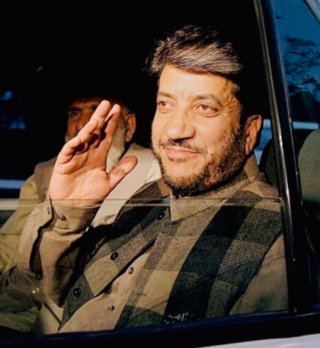
Syed Ali Shah Geelani was an Islamist, Pro-Pakistan Kashmiri-separatist leader in the Indian-administered Jammu and Kashmir, regarded as the father of the Kashmiri jihad.

All Parties Hurriyat Conference (APHC) is an alliance of 26 political, social and religious organizations formed on 9 March 1993, as a united political front to raise the cause of Kashmiri separatism in the Kashmir conflict. Mehmood Ahmed Saghar was the first convener of the APHC-PAK chapter when the alliance was established in 1993. The alliance has historically been viewed positively by Pakistan as it contests the claim of the Indian government over the State of Jammu and Kashmir. The organisation is split into two main factions the Mirwaiz and Geelani, The Mirwaiz Umar Farooq is the founder and chairman of Mirwaiz faction and the Masarat Alam Bhat is the interim chairman of Geelani faction faction he succeeded Syed Ali Shah Geelani after his dead who was the founder and chairman of Geelani faction.

Peerzada Ghulam Ahmad, known by his pen name as Mahjoor, was a poet of the Kashmir Valley, along with contemporaries, Zinda Kaul, Abdul Ahad Azad, and Dinanath Nadim. He is especially noted for introducing a new style into Kashmiri poetry and for expanding Kashmiri poetry into previously unexplored thematic realms. Mahjoor is recognized as father of Kashmiri language.

Mirwaiz Mohammad Umar Farooq is the 14th Mirwaiz of Kashmir. He is a Kashmiri separatist political leader. He is also an Islamic religious cleric of Kashmir Valley.

Yasin Malik is a Kashmiri separatist leader and former militant who advocates the separation of Kashmir from both India and Pakistan. He is the Chairman of the Jammu Kashmir Liberation Front, which originally spearheaded armed militancy in the Kashmir Valley. Malik renounced violence in 1994 and adopted peaceful methods to come to a settlement of the Kashmir conflict. In May 2022, Malik pleaded guilty to charges of criminal conspiracy and waging war against the state, and was sentenced to life imprisonment.
Zinda Kaul (1884–1965) was an Indian poet, writer and teacher. He composed in Persian, Hindi, Urdu and Kashmiri. Kaul also translated works of Kashmiri into English, Persian and Hindi.
Ikhwan force, popularly referred to as the Ikhwan and locally known as naabedh, was a pro-government militia in the Indian state of Jammu and Kashmir, composed of surrendered Kashmiri militants active in the insurgency in Jammu and Kashmir.

Mazar-e-Shura is a cemetery on a small hill by the main road in Dalgate, an area of Srinagar, Jammu and Kashmir in India. Founded in the reign of the Mughul emperor Akbar the Great, it was built in a scenic location on the banks of the Dal Lake as a cemetery for eminent poets. Historical records show that there were five poets and men of letters buried in the cemetery, all natives of Iran who emigrated to India and were associated with the Mughal court. Only three tombstones are now visible as the place is neglected, overrun by weeds and littered with rubbish. One of the tombstones bears an inscription that is only partially legible.
Mohammad Abbas Ansari was a separatist political leader and a well known Shia Muslim scholar, reformer, preacher and cleric from Indian-administered Jammu and Kashmir. He was known for his religious lectures and as a Kashmiri separatist, ex-chairman of the All Parties Hurriyat Conference, also founder & chairman of the Ittihadul Muslimeen also known as Jammu & Kashmir Ittihadul Muslimeen (JKIM) a Kashmiri nationalist Shia separatist political party which aims for Shi'a–Sunni unity in Kashmir & independence of Jammu and Kashmir from India through peaceful struggle. He is considered a moderate and has called for an end to violence in that region. He is Succeeded by his son Maulana Masroor Abbas Ansari.

Shabir Ahmad Shah popularly known as Shabir Shah, in Kadipora, Anantnag, Kashmir is the founder and president of the Jammu and Kashmir Democratic Freedom Party (JKDFP), one of the main separatist political organizations seeking "right of self-determination" to Jammu and Kashmir.
Doru Shahabad is a town and the headquarters of the Dooru tehsil in the Anantnag district of the Indian union territory of Jammu and Kashmir. It is also known as a historical township in South Kashmir's Anantnag district. Doru Shahabad is considered as a place of intelligence, where great scholars like Mehmood shah Gami, Rasul Mir Shahabadi were born. These scholars contributed to the literature and culture of Kashmir. In present times, Shahabad has produced chief ministers such as Syed Mir Qasim,Gull Mohd Malik (Bragami) social activist and Indian National Congress Senior politician,other politicians, bureaucrats, and leading agricultural scientists.
Masarat Alam Bhat is a Kashmiri Islamist activist and Political separatist leader of Jammu and Kashmir. He is currently serving as the chairman of the Jammu Kashmir Muslim League, and also serves as the interim chairman of Geelani faction of the All Parties Hurriyat Conference.
Zakir Rashid Bhat was a Kashmiri separatist who became the commander of Hizbul Mujahideen after the killing of Burhan Wani and Sabzar Bhat, who were the former commanders of the same outfit. He later became the chief of Ansar Ghazwat-ul-Hind.

The 2017 Nowhatta mob lynching, was the lynch mob murder and mutilation of an on-duty undercover Indian Jammu and Kashmir Police officer Muhammad Ayub Pandith, on the Muslim holy night of Laylat al-Qadr on Thursday 22 June 2017 by a mob in Nowhatta after a crowd shouted slogans in favor of Pakistan as well as al-Qaida jihadist Zakir Musa. Sajjad Ahmad Gilkar, a Hizbul Mujahideen militant, had played a key role in the lynching according to the state police.

Ansar Ghazwat-ul-Hind is an Al-Qaeda-affiliated Islamist militant group active in Kashmir. The group's stated objective is to create Kashmir as an independent Islamic state under Sharia law and jihad against India.
Mohammad Ashraf Khan, chiefly known as Ashraf Sehrai or just as Sehrai, was a Kashmiri separatist leader and chairman of Tehreek-e-Hurriyat, a Kashmiri separatist political party. He was elected chairman through a first-ever election conducted in the history of Hurriyat when Syed Ali Shah Geelani relinquished office due to his deteriorating health.

Ghulam Nabi Gowhar was a multilingual Indian Kashmiri author, novelist, poet, columnist and a retired sessions jurist. He wrote about sixty books in Kashmiri, Urdu, and in English languages on various subjects such as politics, literature, history and on Sufism. In 1971, he wrote a novel titled Mujrim, leading him to become the "first novelist of Kashmiri literature". The recipient of cultural and literary awards and accordion, including Sahitya Akademi Award, he is also credited for translating constitution of India into Kashmiri language.
Gani Kashmiri, was a Persian-language poet. His uncertain authorship, including gazals and 100,000 verses, consist of some single tazmins, ninety-two rubaʿis, two maṯnavis, and one twenty-eight couplets and some verses in rekhta. His writings have been reinterpreted by Muhammad Iqbal, Mir Taqi Mir, Saadat Hasan Manto and by a rebellion Mughal poet, Ghalib who is believed to have translated around forty of his couplets into Urdu language.
Maulana Masroor Abbas Ansari is a separatist political leader, Kashmiri religious leader, scholar, cleric, preacher, activist and theologian in Jammu and Kashmir. He is the Chairman of Jammu & Kashmir Ittihadul Muslimeen (JKIM), a Kashmiri nationalist Shia separatist political party that aims for Shi'a–Sunni unity in Kashmir and is also a religious organization that conducts the Grand Ashura Procession In Kashmir. He is the President of Al-Abbas Relief Trust, Karan Nagar, Srinagar, and a Senior leader of All Parties Hurriyat Conference (APHC), an alliance of 26 political, social, and religious organizations formed on 9 March 1993 as a united political front to unite Jammu and Kashmir. He is also a senior leader of Jammu Kashmir Liberation Front (JKLF). He succeeded his father Mohammad Abbas Ansari after his death. Ansari is a religious leader of Kashmiri Shia Muslims, chairman of the Jammu & Kashmir Ittihadul Muslimeen, and Senior Leader of the All Parties Hurriyat Conference.(JKLF).










